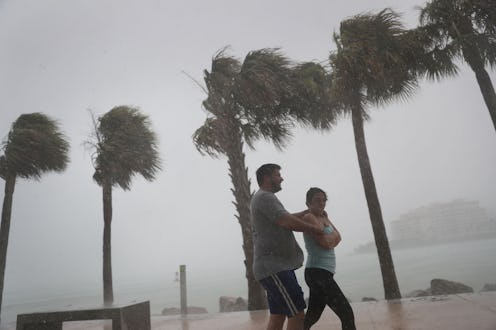
It seems that the weather cycle doesn't care that it's Memorial Day weekend. According to The Weather Channel, a large storm system is slated to overtake parts of the southern United States beginning Sunday night and continuing through Monday. If you're traveling during the next few days, you're probably wondering whether subtropical storm Alberto will affect flights.
While a flight cancelation or delay is the last thing that anyone with plans to fly wants to hear, don't panic. Some airlines have issued warnings to customers, predicting possible delays or cancellations, but as with any meteorological phenomenon, it's going to be played by ear.
Although Alberto spent most of the weekend creeping up on the continental United States, as of mid-Sunday afternoon, the Federal Aviation Administration (FAA) reported no significant delays in the southeastern or south central states. Those would be the regions expected to be most impacted by Alberto over the course of the long weekend. The FAA also reported, per its online status trackers, that all major airports in those areas were operating largely on time, with delays not exceeding 15 minutes, the best rating that the agency offers.
That being said, many major carriers are getting ahead of the game. Some, though not all, major airlines have issued travel advisories, warning passengers that their travel may be disrupted. As of mid-Sunday afternoon, Southwest, American, and Delta all warned of possible weather-related complications. In anticipation of Alberto, some airlines have shared opportunities for customers to reschedule their flights. If you're planning to fly over the long weekend, especially over or through parts of the United States expected to be in Alberto's path, it's best to check your individual airline's websites for posted travel advisories.
According to the National Hurricane Center (NHC), part of the National Oceanic and Atmospheric Administration (NOAA), Alberto spent Sunday moving toward the northeastern Gulf coast. "Alberto is expected to produce heavy rainfall with a risk of flooding and flash flooding over western Cuba, the Florida Keys, and south Florida today," the NHC warned in a message on Sunday. "The risk for heavy rainfall and flooding will then spread over much of the southeast U.S. tonight and Monday."
The center also advised that a "hazardous storm surge" could occur along the eastern Gulf coast, and warned residents in that area to heed warnings and guidance issued by their local governments. "Dangerous surf and rip current conditions will continue to affect portions of the eastern and northern Gulf Coast through Monday," the NHC said.
According to The Weather Channel, Alberto remained a "subtropical" storm through Sunday afternoon. That means, according to the weather news outlet, that the storm has traits found in both tropical and non-tropical storms. Essentially, their winds are less symmetrical, and their heaviest winds are located further from the storm's center. However, The Weather Channel reports that this could change if the cyclone were to tighten up, meaning that it's possible that Alberto could wind up being a full-fledged tropical storm.
The Miami Herald reports that rain is expected to hit the Florida panhandle as early as Sunday night. In anticipation, city officials announced they were closing public pools for the duration of the long weekend, and were also preparing portable pumps in the event that they are needed.
Alberto is the first named storm of the 2018 Atlantic hurricane system, which doesn't even formally begin until June 1. While it seems that the season is off to an early start, NOAA's Climate Prediction Center said in a report that it anticipates a normal to above-average number of storms to take place between June 1 and Nov. 30, when hurricane season concludes. According to the report, the agency expects between 10 and 16 named storms to develop, with the average year producing 12. But, with the storms, as with flight delays, it is simply too soon to tell.